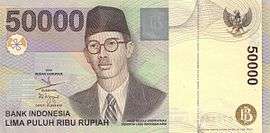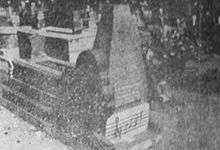Wage Rudolf Supratman

Wage Rudolf Supratman (Wage Roedolf Soepratman in the old orthography or commonly known as W. R. Supratman) (Purworejo, 9 March 1903 – Surabaya, 17 August 1938) was an Indonesian songwriter who wrote both the lyrics and melody of the national anthem of Indonesia - "Indonesia Raya." He is an Indonesian National Hero.
Biography

W.R. Supratman's father was Sergeant Djoemeno Senen Sastrosoehardjo, a Dutch Colonial Army soldier, and his mother was Siti Senen. Supratman was born Wage on 9 March 1903 in Somongari, Purworejo.[1] Several months later, his father added Supratman to his name and explained that he was born in Meester Cornelis, Batavia. Supratman was the seventh of nine children. His eldest sibling was Rukiyem Supratiyah van Eldik.
At the age of 6, he entered Budi Utomo elementary school in Cimahi. After his father retired, Wage followed his sister Rukiyem to Makassar, where he began attending Europese Lagere School (ELS) in 1914. [2] It was then when Rudolf was added to his name, so that his rights would be equal to the Dutch. [3] However, he was asked to leave the school after it was revealed that he was not of European descent.[4] He continued his studies in a Malay language school. After returning home, he learned to play guitar and violin. His brother-in-law, van Eldik, gave him a violin as seventeenth birthday present in 1920. After graduating from Malay language school in 1917, Wage attended Dutch language courses and graduated in 1919.[4] He continued to Normal School, or Teachers' College, and became an auxiliary teacher in Makassar after he graduated.[5]
In 1920, he and van Eldik founded a jazz-styled band, called Black & White. He played the violin. They performed at weddings and birthday parties in Makassar.[6]
Beginning in July 1933, Wage started to feel ill. Then in November 1933, he resigned as Sin Po journalist and settled first in Cimahi, then Palembang, and finally in Surabaya. On 17 August 1938, he died at 01.00 a.m. and was buried in Kenjeran, Surabaya. On 13 March 1956, his remains were moved to Tambak Segaran Wetan cemetery.[7]
Indonesia Raya
Wage composed both the music and lyrics for the song "Indonesia Raya", which later became Indonesia's National Anthem. It was introduced during the Second Indonesian Youth Congress on 28 October 1928. The song was quickly adopted by Sukarno's PNI.[8] The text was revised in November 1944, and the melody arranged to its present musical form in 1958.
Legacy

The government awarded Wage the National Hero title and the Bintang Maha Putera Utama kelas III in 1971.[7]
Religion
Wage belonged to the Ahmadiyya Muslim Community.[9] Some people claim Wage was a Catholic but his family stated in a 1967-issued book entitled "Sedjarah Lagu Kebangsaan Indonesia Raya" (History of Indonesia Raya, the national anthem) that Supratman was a Muslim and his body was bathed and buried in Islamic ways.[10]
References
- ↑ Sularto & Yunarti 2010, p. 171
- ↑ Hutabarat 2001, p. 3
- ↑ Sularto & Yunarti 2010, p. 173
- 1 2 Hutabarat 2001, p. 4
- ↑ Hutabarat 2001, pp. 4–5
- ↑ Hutabarat 2001, p. 5
- 1 2 Sularto & Yunarti 2010, p. 176
- ↑ The Muslim world: a historical survey. Modern times: Volume 4 - Page 307 H. Scheel, Gerhard Jaschke, H. Braun - 1981 "The party's emblem and the symbol of the future Free Indonesia were a red and white flag with a figure of a bull's head, and the hymn sung at its gatherings was Indonesia Raya ("Great Indonesia"), composed by Wage Rudolf Supratman "
- ↑ http://theeagleonline.com.ng/the-cold-war-of-faith-between-hamadiyya-and-orthodox-muslims/
- ↑ Kasasengari 1967, p. 83
Bibliography
- Hutabarat, Anthony C. (2001). Wage Rudolf Soepratman: Meluruskan Sejarah dan Riwayat Hidup Pencipta Lagu Kebangsaan Republik Indonesia "Indonesia Raya" dan Pahlawan Nasional. Jakarta: BPK Gunung Mulia. ISBN 978-979-687-037-0.
- Sularto, St.; Yunarti, D. Rini (2010). Konflik di Balik Proklamasi: BPUPKI, PPKI, dan Kemerdekaan. Jakarta: Penerbit Buku Kompas. ISBN 978-979-709-509-3.
| Wikimedia Commons has media related to Wage Rudolf Supratman. |